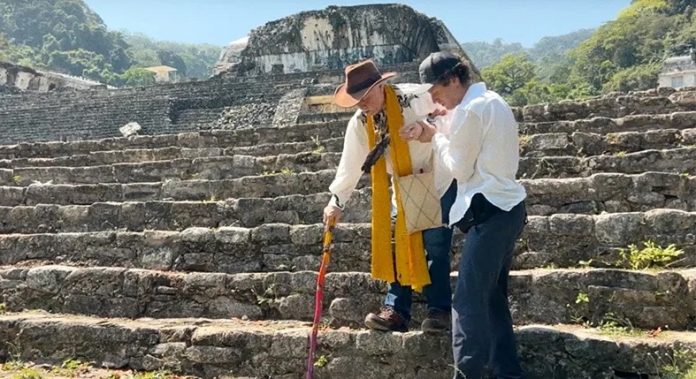THE STORY – An eccentric American peace activist pursues his belief that he’s destined to unite South American tribes and save the Amazon, taking drastic steps to fulfill what he sees as an ancient prophecy.
THE CAST – N/A
THE TEAM – Gabe Polsky (Director/Writer)
THE RUNNING TIME – 85 Minutes
It’s the dream of every documentary filmmaker to find a subject that not only captivates them but is worthy of devoting years of their life to building an entire project around. Many documentarians spend most of their careers in search of this, but for filmmaker Gabe Polsky, it seems the universe has hand-delivered him the subject of the century. A man who might hold the keys to our future, at least according to a centuries-old prophecy. The man in question is spiritual leader and conservative Patrick McCollum, or as Polsky’s latest film calls him, “The Man Who Saves the World?”
Audiences are introduced to this enigmatic figure who, on the surface, appears to be like any other elderly man. His body is somewhat battered, supported by a jury-rigged back strap and plenty of medicine his Social Security checks can barely afford. Polsky, who was introduced to McCollum through mutual friends, is slowly drawn into his orbit and eventually into his mission on this planet. McCollum believes he is part of an ancient indigenous divination that tasks him with uniting all the tribes throughout South America to save the Earth, specifically to stop Amazon deforestation, which threatens not just the rainforest but the planet as a whole.
This character study proves to be as elusive as McCollum himself, a man who has lived many lives. He has worked as a prison chaplain, deep-sea diver, and demolition expert, and these are just a few of the trades he casually mentions when Polsky first visits his home. The man has even been struck by lightning twice. It’s easy for audiences to feel as skeptical as Polsky is, yet for every seemingly exaggerated claim, there is often a surprising basis of truth underneath. There are so many moments of absurdity that as soon as Polsky begins to lose faith, some uncanny event seems to steer him away from doubt. It is often comical how this elderly white man, who comes off as something of a lunatic, is also vouched for by someone as reputable as the late Jane Goodall.
The film begins to shift as Polsky and McCollum travel to Colombia to meet with the Kogi tribe, who have apparently deemed McCollum fit to undertake this enormous task. Polsky probes the question of whether the world really needs a savior. The world is in such bad shape that everyone is wondering what it would take to fix it. Polsky, willing to go along with the experience, still pushes back on the idea of prophecy and white saviorism. McCollum is fascinating because here is a man who genuinely wants to help change the world for the better, yet it’s almost impossible not to feel like it’s all a sham. In a way, the film serves as a litmus test. Polsky establishes this tension, which gives the film a current despite the repetitive nature of his interactions with McCollum throughout the project.
Even with a transfixing subject at its center, “The Man Who Saves the World?” struggles with its structure. Polsky’s narrative is not as grounded as it aims to be, allowing McCollum to dominate the flow as it oscillates between his self-ordained quest for heroism and his personal struggles stemming from a difficult childhood. There is an attempt to inject emotion into the film, but it doesn’t always land as intended. The heart of the story instead emerges from Polsky and McCollum’s push-and-pull dynamic, which ultimately culminates in a finale that examines the idea of faith, not necessarily religious faith, but faith in one another. Whether McCollum truly saves the world isn’t the point. It’s the hope that maybe, just maybe, this wild idea could lead to some sort of awakening, and in that experience, perhaps some kind of change. Life is about challenging one’s perception of the world, and perhaps that starts with believing, even for a moment, in a stranger’s bizarre prophecy about saving the Amazon rainforest.







